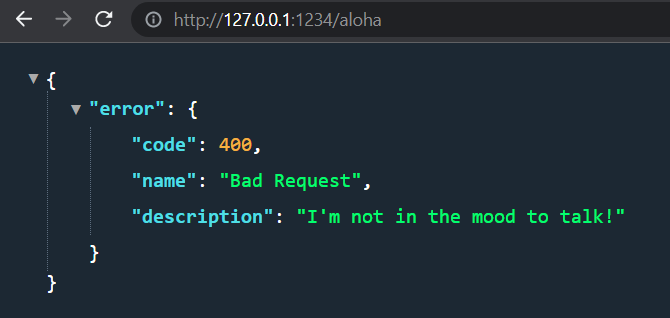It is possible to register error handlers for very generic base classes such as HTTPException or even Exception. However, be aware that these will catch more than you might expect.
For example, an error handler for HTTPException might be useful for turning the default HTML errors pages into JSON. However, this handler will trigger for things you don’t cause directly, such as 404 and 405 errors during routing. Be sure to craft your handler carefully so you don’t lose information about the HTTP error.
from flask import Flask, abort, jsonify, json
from werkzeug.exceptions import HTTPException
app = Flask('test')
app.config['JSON_SORT_KEYS'] = False
@app.errorhandler(HTTPException)
def handle_exception(e):
"""Return JSON instead of HTML for HTTP errors."""
# start with the correct headers and status code from the error
response = e.get_response()
# replace the body with JSON
response.data = json.dumps({
"error": {
"code": e.code,
"name": e.name,
"description": e.description,
}
})
print(response.data)
response.content_type = "application/json"
return response
@app.route('/')
def index():
abort(409)
@app.route('/aloha')
def aloha():
abort(400, "I'm not in the mood to talk!")
app.run(port=1234)
output:
![enter image description here]()
![enter image description here]()
![enter image description here]()
An error handler for Exception might seem useful for changing how all errors, even unhandled ones, are presented to the user. However, this is similar to doing except Exception: in Python, it will capture all otherwise unhandled errors, including all HTTP status codes.
In most cases it will be safer to register handlers for more specific exceptions. Since HTTPException instances are valid WSGI responses, you could also pass them through directly.
from werkzeug.exceptions import HTTPException
@app.errorhandler(Exception)
def handle_exception(e):
# pass through HTTP errors
if isinstance(e, HTTPException):
return e
# now you're handling non-HTTP exceptions only
return render_template("500_generic.html", e=e), 500
Error handlers still respect the exception class hierarchy. If you register handlers for both HTTPException and Exception, the Exception handler will not handle HTTPException subclasses because it the HTTPException handler is more specific.



